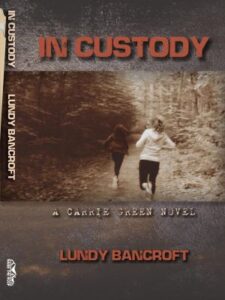In Part 1 of this post, I began exploring some of the reasons why kids may side with a man who abuses their mother, especially if he’s their father. We looked in particular at kids’ desperate desire to feel safe – and it feels safer to be on the abuser’s team — and their desire to escape the pain of injustice, which they can do by deciding that Mom deserved what she got.
There are a few additional causes that are as important as the ones I examined in Part 1.
\
Manipulation By the Abuser
Tragically, most domestic abusers have strong manipulative skills, particularly if they are well-educated. (Yes, the more educated the abuser is, the more psychological damage he can do to kids. But the courts, especially the custody courts, love a well-educated batterer.)
The collection of manipulative tactics they use is endless, so I’ll give just a few examples:
* Get Mom upset when she’s trying to spend good time with the kids.
The abuser especially loves to do this at key times, like birthdays or Christmases or the end of a hard day.
His goal is to create the impression in the children that “Mom is just always upset about something,” casting her as hysterical and moody. He sets it up to make it look as though she’s the one who ruined good times that he actually ruined. You can start to feel like you almost never get to have those close moments, because he always messes them up.
* Undermine her appropriate efforts to set limits.
Dad comes out looking like he’s the fun parent while Mom is the strict one. This dynamic gets worse after the parents split up, because once he starts to have the children alone with him he can get away with doing whatever he wants – which often means letting them get away with doing whatever they want.
The custody court is two-faced on this issue. They’ll declare that parents need to provide a united front for the children; but then when Mom points out that Dad is destroying her maternal authority by letting the kids run wild at his house, the court turns condescending and says to her, “Part of divorce is accepting that each parent is going to have a different parenting style.”
As if the problem had anything to do with “different parenting styles”! The custody courts are the absolute kings and queens of euphemism. They really can’t get it that a domestic abuser loves to destroy the mother’s parental authority?
Of course, at the times when the abuser is mad at the kids he switches into his other personality, sometimes turning outright cruel in his punishments, such as not letting kids go to events that are hugely important to them. Mr. Nice Guy simply disappears when he doesn’t like the way someone is standing up to him, and the real abuser comes out. But the trauma that he causes at these times actually works to his advantage, tragically, because it makes his nice times seem even more dazzling to his (wounded) children.

* Lying
Good manipulators are good liars, and the domestic abuser lies and lies and lies. It’s overwhelming to kids – unbearable, really – to accept the fact that one of their parents is routinely and deliberately dishonest with them. It makes the world feel too scary. So children tend to convince themselves that what he’s saying must be true, even when deep down inside they know it isn’t. As the years go by, the children feel more and more confused about what’s real and what isn’t. And they start to pull away from Mom emotionally because of all the bad things they are being told about her, some of which make her sound absolutely awful.
The custody courts get sick of Mom always saying what a liar Dad is, but it’s the court’s own fault, because they refuse to look into what she’s telling them. If they would bother to check it out, they could easily see that she’s right. (I know how easy it is, because I used to do custody investigations for courts myself, and 90% of the time I could find out which parent was telling the truth by making even the most minimal effort to examine the evidence; but most court personnel, and court-appointed personnel, refuse to do so, and just choose to believe the abuser instead.)
* Control the kids’ access to what they want.
For example, he takes various steps to keep Mom financially broke, then he gets a nice house and buys the children all kinds of things. He looks generous and Mom looks stingy.
Next, he reaches out to relatives of Mom’s and kisses up to them. The next thing you know, the kids are seeing their maternal cousins through him instead of through Mom. (Yes, I run into cases like this over and over again; more on this below.)
Then he tells teenagers he’ll buy them a car, but only if they come to live primarily with him.
And on and on it goes. He keeps setting it up so that he’s the pathway to the things that they desire in life.
I could write a whole book just about how abusive men manipulate kids. But the above examples capture some of the key dynamics that they set up.

Using Societal Messages to His Advantage
The predominant culture in the U.S. and across much of the globe, teaches that:
* Mom’s have the primary responsibility for kids, including for keeping them safe.
* Dads are to be admired if they make any significant contribution to child rearing (in other words, mothers and fathers are judged by entirely different standards, including by the courts).
* Mothers are hysterical and worry too much about nothing.
* Kids can’t turn out okay without a father, especially not boys. They need their father no matter how abusive he is or how absent he has been.
I get so sick of movie after movie (there are dozens of them) where the father is terrible to his children — through some combination of severe neglect and outright mistreatment — and then he finally comes through for his kids years later and we’re supposed to think that’s so wonderful and touching. But find me a single movie where a mother disappears for years (by choice) and then the audience is made to feel moved by the fact that she decided to show up again; I doubt you can do it.
Kids see these movies and they absorb the unhealthy message, along with all the other ones from the list above. And the abuser actively encourages these twisted, sexist values.
Children also can’t help absorbing the powerful reality that in modern society men have far more power than women do. So siding with the abuser doesn’t just put you on the winning side within your own family’s power dynamic, it puts you on the privileged side in the world. This reality is especially seductive for boys, who see that becoming like their abusive Dad opens for them a whole world that they can exploit.

Using Toxicity that Already Exists in the Family Tree
Let’s face it, most family trees have their own issues with addiction, domestic violence, greed, child sexual abuse, narcissism, and other toxic patterns. I’ve rarely talked to anyone who didn’t have at least some of these serious problems present in a few key relatives, and for some people the family tree is riddled with them. (And this is true whether your family tree is rich or poor, formally educated or not, from this culture or from that culture.)
The abuser often builds allies by connecting to toxic individuals among the relatives. He especially loves it when he can build relationships with toxic relatives of Mom’s, and thereby use her own people against her.
The custody courts just eat this one up. They’ll say to Mom, in a tone of contempt, “Your own parents, and one of your sisters as well, have told us that you’re the problem.” Have they bothered to look into what these people are like? Of course not. If they did, they’d find out exactly why these people would side with a man who was abusing their daughter or their sister. (This precise dynamic comes up in my book In Custody.)
These unholy alliances can influence children. The message from Dad, whether actually spoken aloud or not, is, “See how I get along with everyone, while Mom is refusing to speak to several of them?”
Fortunately these maneuvers are much harder to pull off when the Mom has a healthier family tree, and it’s even better if the abuser himself has pretty healthy relatives. But I talk to a lot of mothers who weren’t even aware of how much toxicity there was among their own relatives until they started to see people lining up behind the abuser. And in our times, when there’s been so much public indoctrination teaching people that kids will have ruined lives if they don’t have a father, the abuser can get a lot of mileage by going around crying to the relatives, “All I’m asking is to be able to play a role in my children’s lives.” And their hearts just bleed for him.
Men who care about their children don’t abuse the children’s mother. The damage that it does to children when you abuse their mother is so obvious that you simply can’t miss it — unless you really only care about yourself. The notion that a man can abuse the mother of his children but still be a good father is absurd; abusing a mother is the positive definition of terrible fathering.
But good luck getting toxic relatives – or the custody courts, which currently are as toxic as your worst relatives – to see that obvious fact.
In typical fashion, I have once again run myself out of space. So this post will have to go to a Part 3, since I promised to talk about strategies for rebuilding relationships that the abuser has poisoned. I’ll get to that post within a few days, because many of you have commented on how eager you are to hear those ideas.
Photo by Jed Villejo on Unsplash (teens running away) Photo by Kuanish Reymbaev on Unsplash (classroom) Photo by Leo Rivas on Unsplash (girl with bubble) Photo by Zach Vessels on Unsplash (boys with matching shirts) Photo by Senjuti Kundu on Unsplash (girl covered in paint)

A mom and her daughter mysteriously disappear. Have they fled into hiding? Or have they been kidnapped? The signs seem to point in both directions, baffling law enforcement. A young journalist puts her career on the line to try to find out what has happened to them — and she stumbles into a dark underworld of organized abusers and court corruption. In Custody: A Carrie Green Novel by Lundy Bancroft, available in paperback or Kindle.





Thank you Lundy. This is immensely helpful. I’ve shared it with my lovely support group too. Your insight and support is amazing.
I can’t thank you enough! This has been my life for 5 years. Why do you see it and no one else doesn’t? I just don’t understand. Thank you so much for telling the truth of what is really going on! You’re one of the good ones! Warmly, Angie
Thankyou again, Lundy. Once again you highlight what is so wrong with our society and the legal and welfare groups that are meant to protect our children. In particular the section where you talked about the court seeing family members siding with the father being almost proof that the mother is at fault was right on point. A friend had a court tell her that the fact that her 3 oldest boys (2 adults and 1 teenager, only the teenager was the abusers child) sided with the abuser showed that she was the abuser. Thankyou for bringing these uncomfortable situations to light.
Would love to share in private with people that are going thru it and are not allowed to access any information publicly. How do I share it to WhatsApp?
Thank you for this post. I hope that it helps other women who are experiencing this recognize behaviors that I missed while they were happening right in front of me, in my own home. I would add to this list, always calling Mom by her first name instead of by Mom and having the children do so as well, asking the children for daily reports framed in a very negative manner- I heard my ex asking the kids things like “did she tell at you all day again, like she always does?”. Negatively framing normal parenting behaviors as you detailed above, can be in extreme manners – in itself, gaslighting/ crazy making abuse. (My attempts to parent and discipline were framed as abuse to the kids. If I said, not yelled, please don’t talk to me in that tone of voice to my teenagers, he would interject and scream at me that I was abusing them and not allowing them to be who they truly are, always in front of them.) I also experienced false allegations of being a liar, alcoholism and promiscuity, made to the kids, promises to the kids that they would not have to do chores and be treated as slaves like they were in my home, and extreme oversharing of all details of the marriage and divorce framed as “they have a right to know what’s going on and I’m just being honest and you’re a liar”.
When I recount the behaviors and add them up I can’t believe I did not see what was going on. But these guys are manipulative, my kids were over the moon that their dad was finally taking an interest in them, and I was so broken that I was barely keeping myself alive. And yet, even though I know that now, it’s hard to forgive myself or trust the permanence of the bond with them. I’m very much looking forward to part 3, because my sense of having failed them and the toll it has taken on our relationships continues to haunt and hurt.
Happens just now to us!
Thank you. I am really interested in Part 3 and will this include children who are now over 18? Or by children do you mean minors?
Looking forward to the next post as I have very little hope that I will ever hear from my adult daughter. Your first post she’s a lot of light on the situation and perception on the other side. To date I have tried everything recommended by therapists and certainly that which was demanded by her. Total alienation is the result but I can only hope that it will change.
Patti,
I have the same issue Havent seen or spoken to my adult daughter for 4 years.
Thank you. I’m going through this hell right now. My son don’t want to see me at all, is been two months. I’m going to court soon, I hope they see the manipulation and the pattern of behaviors he has, he’s using my son to hurt me. Praying for everyone who’s going through this, may God give us strength to keep going. Looking forward for part 3.
Thank you for writing your book IN CUSTODY. I just finished reading it this weekend. By the halfway mark, I still had no idea what had happened and I couldn’t wait. I stayed up late to find out what happened to Lauren, the mother who disappeared in the night with her teen daughter, Brandi.
Anyway, this novel tells about underground networks that help mothers who’ve lost custody of their kids in family court. It also discusses the organizations that oppose such mothers.
So much truth to what you have shared. I am nearly 3 years out from beginning to comprehend what was happening behind my back and in front of me that I did not understand was manipulation and abuse for 35 years. So wish I had understood these things decades ago. Adult children siding with the abuser and youngest being brainwashed to believe her primary caregiver was incompetent, hysterical and crazy is exactly the script my ex used. Mother and siblings being lied to by my ex and adult children left me abandoned and excluded from my own dysfunctional family. The Custody Evaluator was incompetent and did not verify even the most basic details of the lies told to her by 3. She believed I was the liar even in the absence of any evidence that I was lying (I am so committed to truth). I was niave and unprepared for the battle that my ex had been waging for 35 years. So many good things have happened in my life the past 2 years but the residual of this past reality continues to impact my relationships with children, mother and sisters. It is hard to comprehend because it would NEVER occur to me that anyone would do what has been done. Looking forward to part 3.
You could be telling my story too. I don’t have answers but I wanted to let you know you aren’t alone. I have found the isolation and sense of abandonment has been overwhelming at times. My mother and sister continually endorse the ‘you’re too sensitive’ accusation to the point where I’ve had to distance myself.
Thank you Lundy,for all of the information that you have provided through the years. Have you written anything that would assist victims after they are out, with preparing or helping the children navigate the manipulation they face from the batterer? Even though the victims are safe and healing, the children will at some point in their lives be confronted by the abuser.
My suggestions for helping kids navigate their dealings with the abuser are in When Dad Hurts Mom and in the entries about parenting in Daily Wisdom for ‘Why Does He Do That?’. But I’d be happy to do a blog post about it soon too.
That would be helpful. I have just started the book “When Dad Hurts Mom”.
I could really use some help. Feeling overwhelmed with information.